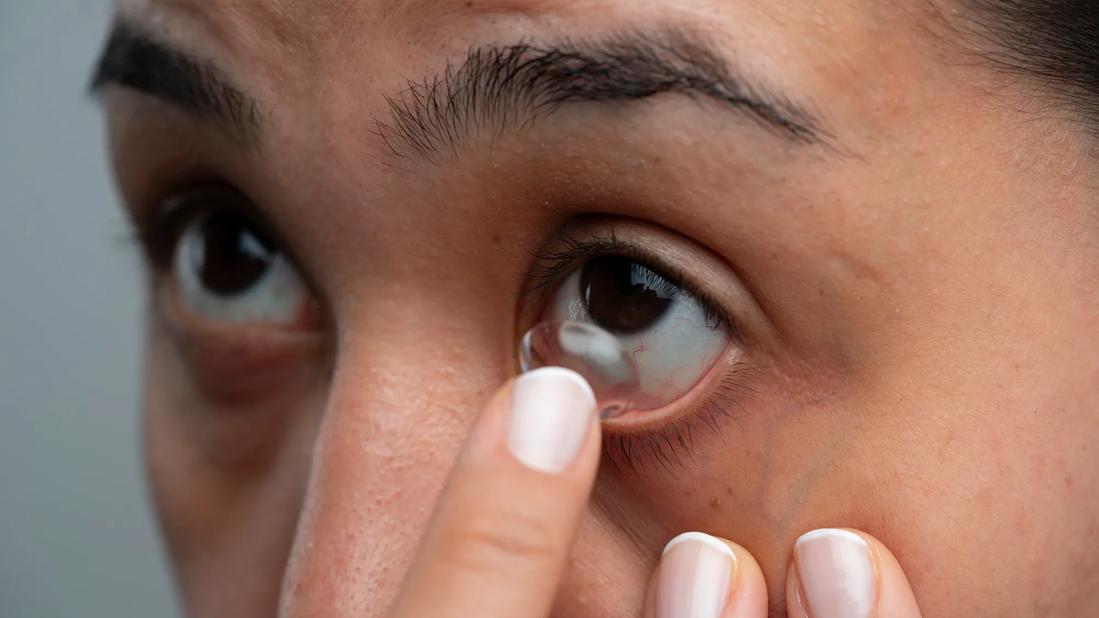When worn incorrectly, contacts can cause or worsen dry eye symptoms

Image content: This image is available to view online.
View image online (https://assets.clevelandclinic.org/transform/2e6182ab-6775-4978-83c0-01102ff14fdb/inserting-contact-into-eye-2150215600)
Person inserting contact into eye
Many people wear contact lenses to see more clearly because contacts are safe and easy to use. But if you’ve got evaporative dry eye, contacts can feel uncomfortable and make your symptoms worse.
Advertisement
Cleveland Clinic is a non-profit academic medical center. Advertising on our site helps support our mission. We do not endorse non-Cleveland Clinic products or services. Policy
Optometrist Alexandra Williamson, OD, explains the connection between contacts and dry eyes and offers some at-home solutions.
Wearing contact lenses can increase your risk of dry eyes, especially as you get older or wear the same pair for long periods. Dr. Williamson says these factors can make dryness worse for contact wearers:
These issues thin out your tears and can make your eyes feel dry, gritty or irritated — especially by the end of the day. Wearing contact lenses long term generally causes the low-level inflammation associated with dry eyes. So, the longer you wear them, the higher the risk of experiencing the following symptoms:
Some people feel like there’s sand or grit in their eyes. Others may experience watery eyes as a reflex response. If you notice these signs, especially after wearing contacts, it may be time to talk to your eye care provider.
Advertisement
If you wear contacts, these strategies can help treat and prevent dry eyes:
Healthcare providers may recommend you switch to using glasses while treating your dry eyes, as contacts can make symptoms worse. Your provider may prescribe specialized contact lenses to help ease your symptoms.
Hydrogel and water gradient lenses are thin lenses that hold water and keep your eyes moisturized. Scleral lenses are another type of contacts that rest on the white part of your eyes. These larger lenses collect a reservoir of tears and bring in oxygen. These can help your eyes stay clear and moist.
“If you have dry eyes, make an appointment with your optometrist before trying solutions on your own,” advises Dr. Williamson. Your provider can check for underlying causes and recommend treatments like prescription eye drops, changes to your lenses or other therapies.
Don’t wait — untreated dry eye can lead to long-term discomfort and even long-term eye damage.
Advertisement

Sign up for our Health Essentials emails for expert guidance on nutrition, fitness, sleep, skin care and more.
Learn more about our editorial process.
Advertisement
Pink eye tends to start in one eye before spreading to the other, while allergies usually affect both eyes at the same time
Early morning red eyes can be a sign of several conditions, like dry eyes, allergies and eye strain
See an eye specialist if your pain isn’t going away and comes with other symptoms
Your eyes could be burning because of allergies, elevated salt levels, dry eyes and more
One is a raised yellow spot on your eye, the other is a fleshy growth
Preservative-free lubricating drops, a humidifier, sunglasses and preventive medications can help with dry eyes, no matter the season
In moderation, vitamins A, C, D, E, B12 and omega-3 fatty acids can improve and maintain your eye health
Pink eye usually refers to infectious conjunctivitis, which can look similar to allergies or other infections and eye conditions
Although it could be used as a moisturizer, this new trend is not recommended
Communicating clear limits helps protect your time, energy and emotional well-being
High cholesterol can be genetic, but testing and treatment can lower your heart disease risk